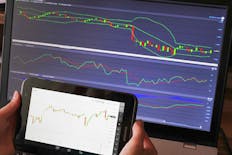4 Best High Leverage Forex Brokers in 2024
All products and services featured are independently selected by WikiJob. When you register or purchase through links on this page, we may earn a commission.
There are many different tools, expert advisors and strategies out there that could be used to increase your profit margins when trading forex.
One of these is to make the most of leverage.
Not all forex brokers offer leverage as a trading tool, and the ones that do will have different rules and margins that you need to be aware of.
In this article, we will examine the best high-leverage forex brokers and provide you with the information you need to make an informed decision about which is right for you.
The 4 Top High Leverage Forex Brokers
1. AvaTrade
Pros
- Well regulated
- Competitive spreads
- 0% commission available
Cons
- High inactivity fees
- Not available in the US
- Leverage capped at 30:1 for UK traders
AvaTrade is one of the most popular and well-known brokers out there, and has been offering traders access to markets since 2006.
In that time, it has been regulated in Europe, Australia, Japan, UAE and South Africa, among others, which makes it highly trusted.
If you are in the right location, AvaTrade will offer leverage of up to 400:1, but this is capped in the UK to the limit of 30:1.
AvaTrade offers 55 currency pairs alongside commodities, indices, stocks, and bonds.
This broker is perfect for the beginner and the more experienced trader – you can practice your strategies using the built-in demo account and get used to using leverage without risking your capital when you are getting started.
You can use its proprietary web and mobile trading system or your MT4 and MT5 accounts.
The minimum deposit is just $100, and many trades are offered with both 0% commission and tight spreads, so they offer good value for money.
2. XTB
Pros
- Up to 500:1 leverage available
- No minimum deposit
- Fast account sign-up
Cons
- Only offers 48 forex pairs
- Doesn’t offer MT4 In the UK
- Crypto is only available through CFDs
XTB is a reputed broker that works for both beginner traders and those with more experience.
For the trader looking for leverage, you can take advantage of up to 500:1 margin-based, depending on your location. There are two account types available.
XTB is a broker that offers the opportunity to trade commodities with leverage as well as forex, although you won’t get the same boost for this (gold trades with 1:200 leverage, for example).
One of the most impressive things about XTB is the work put into the proprietary platform, xTrader 5, which is available as a web app and for mobile. This platform has high-level charting tools and dozens of technical indicators and is seamless when moving between the web and mobile interfaces.
The Standard account will be most suitable for hobby traders, while the Professional account is aimed at those individuals who trade as part of their career.
If you want to spread your risk, you can diversify your holdings using a range of other trading instruments, such as stocks, ETFs, indices and some cryptocurrencies, as well as commodities and forex.
CFDs are complex instruments and come with a high risk of losing money rapidly due to leverage. 76% of retail investor accounts lose money when trading CFDs with this provider. You should consider whether you understand how CFDs work and whether you can afford to take the high risk of losing your money.
3. Forex.com
Pros
- Well-regulated
- Multiple financial instruments available, as well as forex
- Demo account available
Cons
- High inactivity fees
- Ony 80 currency pairs
Forex.com is a well-regulated forex broker and as can be gathered from the name, it is a broker that was created specifically to support traders who wanted fast, quality execution on the forex market.
Launched in 2001, it offers regulated brokerage services in the UK, US, Canada, Australia and many other places.
Several different account types are available, from the standard account, which offers commission-free trading with competitive spreads, to the raw account, which has tighter spreads but charges a small commission.
There is also a demo account available for beginners (and for more experienced traders who want to practice new strategies and techniques for trading).
The forex.com proprietary web and mobile app are clean and easy to navigate. It offers access to research and charting tools.
You can also access MT4, MT5 and TradingView, which will help you make better decisions.
Alongside 80 currency pairs, you can also trade gold, silver and CFDs in indices, stocks and cryptocurrencies.

4. Vantage
Pros
- Low fees
- 1000:1 leverage offered in some markets
- Can use Expert Advisors
Cons
- Less than 50 forex pairs offered
- Access to Pro Trader Tools requires £1k deposit
- Spreads are less competitive
Vantage, sometimes known as Vantage Markets, has been in operation since 2009 and is regulated in the UK and Australia, among others.
With more than 250 trading instruments available, there are more investing opportunities than just forex – which is a good thing, as there are only 49 forex pairs available.
Depending on your location, you can take advantage of 1000:1 leverage on forex, which is an excellent way to boost your profits with minimal investment and make the most of the $50 minimum deposit.
Beginner investors will find the demo account to be the most useful part of the Vantage offering, especially as the education and research available from the broker are lacking in comparison to some of the other brokers.
Not only can you get access to both MT4 and MT5 via the web trader, but Vantage has also developed a proprietary trading app that is available on mobile – on both iOS and Android. Vantage also offers the opportunity to use Expert Advisors and add-on copy trading from Myfxbook, DupliTrade and ZuluTrade.
What Are High Leverage Forex Brokers?
Forex brokers are the bridge between you as a trader and the foreign exchange, and the right broker will be able to execute buy and sell orders on your behalf on the forex pairs that you want to trade quickly, efficiently, and with the lowest cost to you.
There are potentially hundreds of forex brokers available, and many offer other trading instruments like stocks, commodities, cryptocurrencies and forex pairs, making them ideal for those who want to diversify their investment portfolio.
High-leverage forex brokers offer you the opportunity to use leverage to make the most of potential profit in your trades – by essentially lending you funds beyond what you can afford from your capital alone.
What Is Leverage?
Essentially, leverage uses borrowed money to increase your financial position.
Leverage in the financial world exists outside trading, and the use of leverage by some of the world’s biggest financial institutions has been recognized as part of the reason for the 2008 recession – so it is not something to be taken lightly.
In forex, leverage is the opportunity to borrow money from the broker to make a much larger transaction than you can cover using the available cash balance.
To make this happen, brokers usually offer margin-based leverage, which is where you stake a percentage of the total cash value of the proposition, and they stake the rest.
To determine what this would be in figures, you can divide the total transaction value by the amount of margin the broker requires.
For example, if you need to provide a 1% margin on a $10,000 transaction, you must invest $100.
You can always contribute more than the margin for your leverage – this is known as real leverage and is more likely to impact your profit (and loss) than margin-based leverage.
Regarding forex trading, brokers commonly offer leverage of 100:1 – for every $1 you put up as a margin, they lend $99.
Some brokers offer 2000:1 or even 3000:1.
Brokers are usually happy to provide this service to forex traders because the currency is measured in tiny movements called pips, which are valued as a fraction of a cent. Therefore, to make any sizeable profit, movements need to be magnified (using leverage, for example).
The more leverage you use, the greater the risk – but the greater the rewards, too. Leverage in forex is usually significantly higher than in other equities or futures.
The amount of leverage you can apply to your forex trading will also depend on your location – the limits are governed by regulators, which differ across the globe.
For example, in the UK, Europe and Australia, you can usually leverage up to 30:1 on major forex pairs, whereas in the US, it is up to 50:1.
Offshore forex brokers will typically offer the highest leverage, but you should be aware of the jurisdiction they cover and how they are regulated for your financial safety.
How to Pick the Best High Leverage Forex Brokers
Step 1. Research the Platform
The more you know about the brokers that you are interested in, the easier it will be to make the right decision.
Not only do you want to make sure that they actually offer the high leverage they advertise in your jurisdiction, but you also want to make sure that they are well-regulated and considered safe.
You should try to find independent reviews for the brokers you are considering, too. These are usually a good way to decide on which one is best for you, based on what real traders are saying.
Remember to look for reviews that mention things like customer service, fees, and execution rather than people complaining about losing money on questionable trading decisions.
Step 2. Know Your Investment Strategy
As a beginner, you will probably want to choose a broker that has lots of education and research so you can learn as you go. Demo accounts are particularly useful for this as they allow you to try new things without risking your capital.
For more experienced traders, you will want to look for a broker that allows you to use your preferred trading strategies. This might include hedging, leverage, copy trading, or expert advisors.
Not all brokers offer the same trading tools, charting, and research – so make sure that the ones you are looking at will suit the way you trade.
Step 3. Check All the Costs
Last, and by no means least, is costs. Trading forex will attract costs, and this can include everything from commission and spread to account fees.
First is the minimum deposit. Many brokers do not have a minimum deposit, but some will require you to make some sort of cash deposit to start trading, and this can range from $10 to $1,000 or more. Professional-level accounts may have even higher minimum deposits.
While many accounts offer commission-free trading, the broker makes money for each trade through the spread. Tighter spreads are often offered when there is a commission, so this usually only works out cheaper if you make larger value trades.
Aside from the actual cost of trading, other fees could be changed. Some brokers have account management fees, while others charge after a period of inactivity. Deposit and withdrawal fees are also common.
Should You Go with a High Leverage Forex Broker?
As with all trading, leveraging forex comes with risk – and the more you leverage, the higher your risk will be.
Below are some pros and cons you should be aware of before starting to trade with leverage.
Advantage — Low Amount of Trading Capital
One major benefit of using leverage is that you can open a large position without using all your trading capital.
With a 1% margin, for example, you don’t need to put your whole cash pot on one trade, but you can still take advantage of a good deal.
Advantage — Confident Trading Positions
Leveraging a trading position you are confident about is the best way to amplify your profits.
This can mean making the most of minuscule price changes, especially when forex moves a couple of pips at a time.
Disadvantage — Enhanced Capital Management
With leveraged trades, you can open more positions, giving you ample cash diversification and improving capital management.
This is especially true if you are leveraging on more than just forex, but even if you aren’t, you can build a good, diverse portfolio using the cash you are not putting into the leveraged position(s).
Advantage — Enhanced Day Trading Margins
Forex is one of the trading instruments that lends itself to day trading. It is highly liquid but not too volatile.
The downside is that there are small profit margins for the trader unless they leverage to make the most of each trade. Leverage is also popular with scalpers working with micro percentage gains.
Disadvantage — Amplified Losses
Leveraging works both ways. While it can amplify your profits, it will also amplify any losses to the same magnitude.
This is most likely to happen if you overleverage, so consider mitigating your risk by not putting too much into each trade.
Disadvantage — Margin Call Risk
If the trade value of your position goes down by more than the margin you have put up, the broker might liquidate your position, which would mean that you lose not only the trade but also the money you have put into it.
Brokers do this to protect themselves as much as protecting the trader, and there isn’t much you can do to prevent it from happening other than try and bet on a sure thing or at least keep an eye on the market so you can sell before it gets that far.
Disadvantage — Negative Balance
If your position becomes liquidated, you are usually safe from owing the broker money. However, if this doesn’t happen for some reason, your leveraged losses could put you in a negative balance and actually cause you to owe the broker money.
Many brokers offer negative balance protection, which should ensure this doesn’t happen.
Disadvantage — Overtrading
While diversifying is often seen as a great investment strategy, you might risk spreading your capital too thin if you rush to buy into every market.
The additional risk to this is entering a market you are unfamiliar with and not doing the necessary research to ensure that you are buying into the right financial instrument.
Frequently Asked Questions
CM Index is a broker offering a maximum leverage of 8888:1, but depending on your country and the relevant restrictions, this may not be the leverage you are offered.
The highest leverage in forex trading is 8888:1, which is offered by CM Index. Regulators have limited the amount of leverage that a trader can use, depending on their jurisdiction – for example, in the UK it is 30:1, while in the US it is 50:1.
CM Index is a broker that offers a maximum of 8888:1 leverage on forex, the highest available on the open market. However, this leverage is not available to all traders.
Many brokers offer 20x leverage, including favorites like forex.com. However, some brokers have fixed leverage at the maximum allowed in that jurisdiction; therefore, it’s worth checking that you can adjust your leverage before you open an account.
Vantage is one forex broker that offers 100x leverage to some traders, depending on their country of residency. Other brokers offer up to 500:1, 2000:1 or even more.
Final Thoughts
Amplifying profits using leverage can be a good way to make the most of small profits on the forex market, but remember that it can also amplify losses in the same way.
If you are not careful, this could lead to you losing not only your whole investment but could end up owing the broker you are using money.
To make the best decision about whether trading with leverage is best for you, be sure you research the brokers and know your strategy – and beware of leverage that seems too good to be true, especially if you are in a jurisdiction that applies leverage limits to trades.
WikiJob does not provide tax, investment or financial services and advice. The information is being presented without consideration of the investment objectives, risk tolerance or financial circumstances of any specific investor and might not be suitable for all investors. Past performance is not indicative of future results. Investing involves risk including the possible loss of principal.





